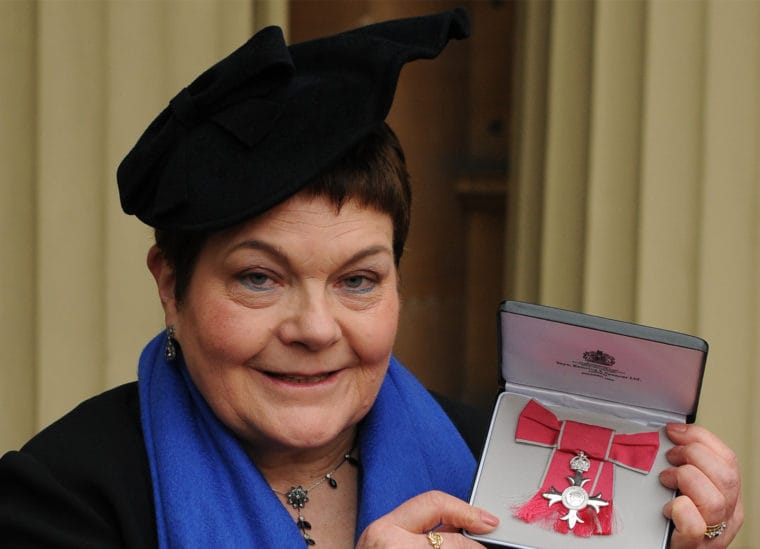Like most of us, Laurian unconventionally entered into the fashion industry. Originally trained as an archaeologist, she began her career with Samuel Courtauld, the fabric manufacturer. “I was the first ever graduate they had and they didn’t realise I was a woman until I turned up,” she says, “they said they’d never had a woman in management before and that it would be unusual, but I said, that’s fine, I’m used to unusual.”
Following her stint at Courtaulds, Laurian took a job, created specifically for her, with the Clothing Export Council of Great Britain (now the UKFT) to teach members about modern export practices. Laurian travelled across the UK, working with manufacturers and established labels, talking to their export departments. “It was extremely challenging, but I enjoyed it. The organisation changed a lot over the years; I stuck with it and I have watched the industry change enormously too.”
Contemplating these changes, and the stark contrast to when she first started her career, Laurian notes, “management structures are flattening, there is pressure to give everybody an equal chance. There may not be as many women in management in fashion and textiles as there might be in other areas but that is improving. There are some very interesting women at the top now which is gratifying.”
Throughout her career, Laurian has always championed British design, “the one thing we’ve always been very good at is making stuff, from designers and brands to retailers.” But, she believes, Brits have a problem with communication. “The British, as a whole, are very shy. We’re far too shy about promoting ourselves and I don’t think it has changed at all, even with the advent of PRs and with social media. It’s getting the passionate message about your brand across, get over the shyness and let their enthusiasm shine through.”
The UKFT regularly holds seminars and workshops for members and non-members, which includes one on overseas trade shows. And when it comes to communicating about their latest collection to international buyers and press, that is when “the shyness falls away.”
“Throwing themselves in at the deep end isn’t the best approach”, she says, “brands can get very enthusiastic launching overseas and sometimes too quickly, without having done any research. When you look at other industries, our lot are very early exporters, much earlier than other industries.”
The amount of work that needs to be put in ahead of showing overseas, Laurian feels, is often overlooked. “There are no reservations and sometimes, there ought to be.” Using the US as an example, Laurian says, “I get scared when people launch in the States without thinking about selling landed, at a duty-paid price or keeping their price consistent. To get deliveries in on time, not a day early, not a day late, it’s a lot of work.”

In 2018, Laurian was made a Member of the British Empire for her service to Young Fashion Entrepreneurs and Exporters. Offering her advice and expertise to brands hoping to tackle new markets and territories, Laurian has seen it all. From goods being held up at customs to businesses going completely bust from having the wrong paperwork.
“Paperwork is one thing, another aspect of starting in export which can cripple a business is not understanding dealing with agency law. They’ll appoint agents, not read paperwork and find out they’re committed forever and maybe have even given away their trademark. I’ve always applauded what Zedonk does because it helps newer exporters learn the ropes”.
And by being more organised when it comes to paperwork, Laurian believes systems can help boost a brand’s productivity, especially in the early stages of exporting. “Systems can give them the time they need to understand, and really work hard at markets. If they free themselves from the shackles of paperwork and drawing up all the necessary import and export documentation, this gives them time to be creative, to look at marketing and keep in contact with buyers and agents.”
With more and more fashion weeks gaining attention across the globe, Laurian and the UKFT team travel to them all, identifying the potential for British brands and any key trends. Over the years, travelling to everywhere from Paris and Milan to Shanghai and Tokyo, she finds, “most of the selling and connecting starts at over overseas trade shows.”
One market in particular, that she sees as thriving is South Korea, now a sophisticated one in its own right. “It used to be, when you went to Japan, you’d tag on a visit to Korea because you thought the market was so similar. But with the advent of K-Pop, Korean influencers, skincare and beauty, people can see that they are two completely different markets, albeit only 500 miles apart.”
To successfully crack these up-and-coming markets, Laurian feels brands and designers need to carefully look at their pricing structures, and ultimately, be confident in their product. “The principle is, value yourself, be confident and tell people what you are doing. But also, look at your prices and what is included from the beginning, so you don’t end up paying for customs duties and transport charges that you weren’t expecting. Value yourself and value the business. Be realistic about how much you are getting out of it because there’s no fun in it if it’s not paying you.”
https://www.instagram.com/p/B55Bm11gD8F/

